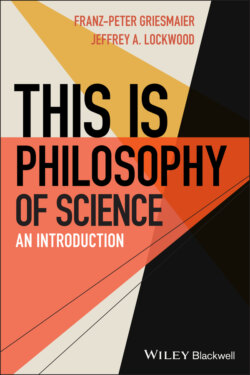Читать книгу This is Philosophy of Science - Franz-Peter Griesmaier - Страница 11
1.1.1 Conclusive Reasons
ОглавлениеThe first type of epistemic reasons are called conclusive reasons. A reason (R) is conclusive for some belief (B) if and only if the belief B must be true if R is true. And this condition holds even if there is not just one reason for B, but also in cases in which B rests on many reasons. In more general terms, if all the reasons for a belief are true, and if they are conclusive reasons, then their target belief must be true. Conclusive reasons guarantee true beliefs, which is strongest basis one can have for believing something. So, how can we understand this definition?
A good example for conclusive reasons are the premises of a deductively valid argument. In such an argument, if all the premises are true, then the conclusion must be true as well. Here’s a simple example:
| Premise 1: | All humans are mortal. |
| Premise 2: | Stephen Hawking is human. |
Conclusion: Thus, Stephen Hawking is mortal.
Clearly, if premises 1 and 2 are both true, then the conclusion is guaranteed to be true. Thus, the two premises together are conclusive reasons for believing that Hawking is mortal. But this sort of reasoning is not often helpful for advancing our scientific understanding of the world. Let’s see why.
Notice that in a deductive argument, what’s really happening is that information that is already contained implicitly in the premises, is made explicit in the conclusion. In other words, the conclusion does not reveal any new information. It restates the information that’s already contained in the premises. That’s why such inferences are safe: truth in – truth out.
Deductive reasoning (i.e., reasoning that proceeds by providing conclusive reasons) is mostly confined to two major disciplines: mathematics and logic. Yes, sometimes we use deductive reasoning in the empirical sciences, such as in cases in which we deduce observational consequences from a theory in order to test it (which can include refuting the theory):
| Premise 1 (Theory 1) | All birds can fly. |
| Premise 2 (Theory 2) | Penguins are birds. |
| Premise 3 (Deduced Consequence) | Penguins can fly. |
| Premise 4 (Observation): | Penguins can’t fly. |
| Conclusion: | Not all birds can fly. |
However, a lot of scientific reasoning is nondeductive. Why? Because typically, in scientific reasoning, we want to infer something about the world at large on the basis of a limited number of observations. Such inferences are inherently risky because their conclusions convey information that goes beyond the information contained in the descriptions of the actual, limited observations that have been made.
For example, if I infer, on the basis of having observed the eating habits of 20 koalas, that all koalas eat eucalyptus leaves, I make such a risky inference. I assume, among other things, that the koalas I observed are typical of their species. This assumption could easily be wrong, as I might have come across a peculiar band of koalas that happen to consume eucalyptus. That such inferences are risky, however, doesn’t show that they are altogether unreasonable. The conditions under which they are reasonable are somewhat difficult to pin down, and we will tackle this challenge in the next section.
Now, given that reasoning nondeductively is risky, and that the conditions of its reasonableness are somewhat elusive, one might think that science should aim at just using deductive inferences, precisely because they are safe – even certain. But that would be a mistake. Remember: They are safe because in an important sense, they are uninformative. Since there is no new information in a deductive conclusion that was not already implicitly contained in the premises, deductive inferences won’t allow you to gain more information about the world by reasoning from your evidence. To accomplish this, we need to go beyond an obsession with certainty, which is provided by conclusive reasons and reasoning, and enlarge our toolbox. The tools we need, especially for the empirical sciences, are various forms of defeasible reasoning, and thus defeasible reasons.
